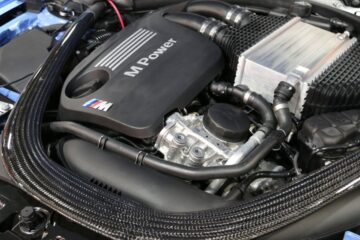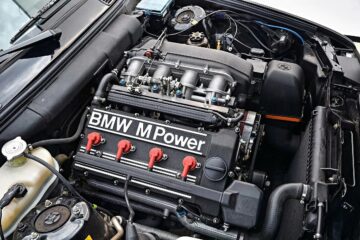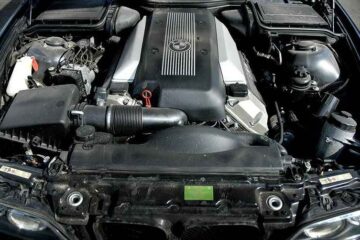BMW AG (Bavarian Motor Works) is one of the most famous and recognizable German automakers. It mainly specializes in the production of luxury sports cars that are sold all over the world. The brand forms the German big three along with major German automakers such as Audi and Mercedes-Benz. At the same time, the Munich-based company owns other popular car brands that include Mini and Rolls-Royce.
The main feature of BMW’s main engines is that they are very reliable, innovative and durable. Such characteristics have led to numerous prestigious awards, including Engine of the Year. This is why BMW engines have gained an excellent reputation and are highly regarded by consumers from all over the world.
Bavaria Motors introduced an inline 4-cylinder engine. The main feature was the Twin Scroll turbocharging technology, which has 2 channels separating the turbine chamber. The use of this technology allows you to significantly increase the speed of traction response to the gas pedal. If we compare this engine with its predecessors, it wins due to high revolutions. The faster the power unit “spins” the more thrust and horsepower it will produce.
Engine specifications B48B20
| Power, hp. | 184 – 258 |
| Fuel type | AI-95 gasoline |
| Volume, cm*3 | 1998 |
| Maximum torque, N*m (kg*m) at rpm. | 270 (28) / 4600; 290 (30) / 4250; 290 (30) / 4600; 350 (36) / 4500; 350 (36) / 4800 |
| Fuel consumption, l/100 km | 2.5 – 7.8 |
| Engine type | In-line, 4-cylinder |
| Additional information about the engine | direct fuel injection |
| CO2 emission, g/km | 56 – 178 |
| Cylinder diameter, mm | 82 |
| Number of valves per cylinder | 4 |
| Maximum power, hp (kW) at rpm. | 184 (135) / 5000; 184 (135) / 6500; 231 (170) / 6000; 249 (183) / 5200; 249 (183) / 6500 |
| Blower | Turbine |
| Start-stop system | yes |
| Compression ratio | 10.2 – 11 |
| Piston stroke, mm | 94.6 |
Advantages
For the first time, this powertrain variant was presented to the general public in 2015. The first car to be fitted with this engine was a restyled version of the BMW F30.
The BMW B48 is a turbocharged four-cylinder gasoline engine that replaced the BMW N20. It has been in production since 2014. It is part of BMW’s modular engine family of 3-cylinder (B38 / B37), 4-cylinder (B48 / B47 ) and 6-cylinder (B58) engines
BMW has revealed the next-generation 2.0 liter turbocharged four-cylinder engine at the BMW EfficientDynamics innovation days. The amazing thing is that the MINI and 330i will now share the same stock engine!
The supercharger is a double helix block. This one was impossible to realize on the B38 because it had an uneven number of cylinders. This block has its own dedicated coolant pump. The intake manifold also serves as an intercooler for water and air for rear wheel drive cars, front wheel drive cars use a conventional intercooler.
In modern BMW engines, the timing chain is at the rear of the engine, hopefully more reliable than the N47. The oil pump is driven by the chain, which is also at the rear of the engine. It has its own chain tensioner and guides. The high pressure fuel pump is driven by the camshaft, not by a timing chain as in previous models.
In addition to the top cover, there are four acoustic covers, which significantly reduces noise levels. They also provide thermal insulation that helps the engine warm up faster.
Modifications
- B48B20T As of early May 2014, this is the most powerful variant of BMW’s efficient 4-cylinder engine found in production cars with a gasoline unit. This engine is available on the BMW 330i F30 and xDrive LCI.
- B48A20 This 2-liter, more powerful motor is fitted to the same 2 Series 225i Active Tourer F45 minivan, including the all-wheel drive 225i xDrive version. Since October 2015, the motor has been fitted to the second-generation BMW X1 crossover – F48 xDrive25i
Technical specifications
The powertrain was a work of reliability and it was not without reason, because it was put on a wide range of BMW cars. The engine was produced by BMW Plant Hams Hall, and engineers called it serial number 20.
The cylinder block was made of aluminum. “Consumed” exclusively 95 and 98 gasoline, had an in-line configuration with four cylinders. The two-liter engine produced 190 horsepower, at 5,000 engine revolutions. As for torque, from 270 to 350 Newton meters, at 4,600 rpm to 4,800 respectively. The engine utilized technologies of the European Euro-6 standard.
Oils
Motorists were satisfied with fuel consumption of 9 liters per city, while driving on the highway, they were satisfied with six liters of consumption per 100 km, and the mixed cycle was happy with seven liters of 95 or 98 gasoline. As for oil, the engine consumes about 700 g for every 100 km of travel. Engineers recommend using branded oil 5W 30 or 5W 40. Carry out an independent oil change or go to a car service station after 10,000 kilometers of mileage. The consumption in the article is specified for good and high-quality German autobahns. For our roads, domestic experts recommend changing the oil after 8,000 kilometers of mileage. In order not to overfill the oil, engineers also recommend pouring no more than 5 liters into the power unit.
Chip tuning
The figures we gave them above are suitable for stock cars. But since, Bavaria Motors to the end, and local and domestic tuning ateliers saw the wide potential of the engine, chip tuning of this engine is widespread, which will lead to the total power of the power unit – about 300 horsepower. If the car is chipped at a specialized service, then, as practice and reviews show, the potential for loss of engine resource is reduced to zero.
Reliability
Let’s talk about reliability. Officials at service stations say that the engine resource of this model, is comparable to the service standards of other cars of the same class. German engineers, in the instruction manual of the car, recommend checking the gasoline unit every 10,000 km of mileage. And we are not talking about the mandatory
scheduled technical inspections every 5,000 kilometers. And do not use the services of garage S.T.O. But about this will be another article, and we continue to talk about common problems with the engine. As in other power units, extraneous noises and knocks may appear during prolonged operation. The culprit is unstable and loosened crankshaft operation. It is also necessary to pay attention to the exhaust manifold, which can become clogged with soot and other waste products, which directly affects a serious loss of engine power.
German engineers allow you to perform routine engine maintenance in your garage. We mean replenishing the oil level, replacing the main cylinder block gasket, oil caps and so on. However, it is necessary to perform major repairs only in the boxes of official service centers.
In order to determine the problem in this engine, it is definitely recommended to perform a scheduled diagnosis at the S.T.O. Quality overhaul in the garage conditions to make absolutely impossible, as well as it can lead to more serious damage, and significantly increase the check for service.
Bottom line
To summarize, we can say that power units of B48B20 series are a high indicator of German quality and reliability. It is impossible to call these engines millionaires, but they are able to give the driver 700-800 thousand kilometers of pleasant ride, taking into account proper maintenance of the power unit, quality oil and fuel. Average consumption figures, and the possibility of tuning the engine almost to 300 horsepower. At the same time get from 270 to 350 Newton meters of torque. If you add a rear-wheel drive BMW 5 Series to the mix, you’re in for a treat. See you later.



0 Comments